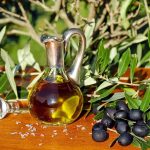While kimchi is favored for its studied health benefits such as few calories, no fat, and high amounts of vitamins, fiber, and probiotics, it does have one downside: it can cause gas.
Kimchi contains gas-producing ingredients such as onion, radish, cabbage, and pear (in some recipes). It can also be hot and spicy, which induces a fast movement of food in the gut and causes the production of gas.
What can you do to reduce the chances of getting gassy and bloated, and should you be concerned? We answer these questions in detail below!
Can Kimchi Give You Gas?
Before anything else, let’s describe what kimchi is. Kimchi is a fermented food made with vegetables. Among the bacterial species in kimchi is lactobacillus, a probiotic.
In previous studies, lactobacillus content was found to increase when more garlic was added. In contrast, the lactobacillus content decreased when more red pepper was added (source: Nutrients).
According to another study, gas and bloating are linked to small intestinal bacterial overgrowth (SIBO) and D-lactic acidosis from probiotic consumption (source: Clinical and Translational Gastroenterology).
However, the participants in this study mostly took probiotic supplements, not probiotics from cooked food.
In kimchi, the vegetables don’t have as much sugar as some other fermented foods. The glucose molecules from the vegetables get converted into lactic acid, ethanol, and carbon dioxide. Carbon dioxide can cause gas and bloating. (source: Vegetable Fermentations).
Why Does Kimchi Give Me Bad Gas?
Fermented foods like kimchi are abundant in probiotics. Probiotics are non-pathogenic microorganisms known for their well-researched health benefits. While they can be healthy and effective in promoting good gut health, they’re not for everyone.
Some people who consume probiotic-rich foods like kimchi don’t always have the best reactions. Moreover, consuming too much can cause gas, stomach pain, and even diarrhea (source: UC Davis Department of Nutrition).
Kimchi also contains garlic and onion. Garlic promotes lactobacillus production. Onion is also listed as a gas-promoting food (source: Gastroenterology & Hepatology).
Pears, which are sometimes used to make kimchi, contain sugars that may result in gas (source: National Institute of Diabetes and Digestive and Kidney Diseases), while cabbage and radishes are also great gas producers.
Hot and spicy kimchi can also cause gas. This is because hot and spicy ingredients make the movement in the gut faster than it should be. The fast movement causes gas to be produced (source: University of Michigan).
If you make homemade kimchi, you can choose to add fewer onions and radishes, pass over the pear, and don’t add too many spices and chili peppers.
Another tip is to eat slowly. Eating fast can make you swallow additional air and exacerbates gassiness.
Does Kimchi Cause Smelly Gas or Farting?
As mentioned above, kimchi contains gas-producing foods like onion, radish, cabbage, and pear. Some kimchi also contains spices and chilies, which make the movement in the gut faster than normal and this creates gas.
Usually, this is not a case of concern for many people. But hot and spicy foods on their own, especially for the uninitiated, can cause discomfort in the stomach.
However, if you keep eating kimchi and still get a bad reaction every time, we recommend asking your doctor about it, especially if you also have abdominal pain, constipation, or diarrhea to make sure there are no underlying conditions.
Some prevalent medical causes of gas are:
- Gastroesophageal reflux disease (GERD)
- Irritable bowel syndrome (IBS)
- Lactose intolerance
- Bacterial overgrowth in small intestines
- Constipation
- Gastroparesis
- Overeating
- Body weight gain
- Swallowing air
Other severe causes include:
- Dumping syndrome
- Celiac disease
- Ascites
- Tumors
- Digestive tract obstruction
- Stomach cancer
- Colon cancer
- Ovarian cancer
- Insufficient digestive enzymes (pancreas not producing enough)
(source: MedlinePlus, National Institute of Diabetes and Digestive and Kidney Diseases)
If you have kimchi for a meal, try not eating other fermented foods to see if kimchi is the cause of your gas or bloating. We hope you found this article helpful!






Comments are closed.